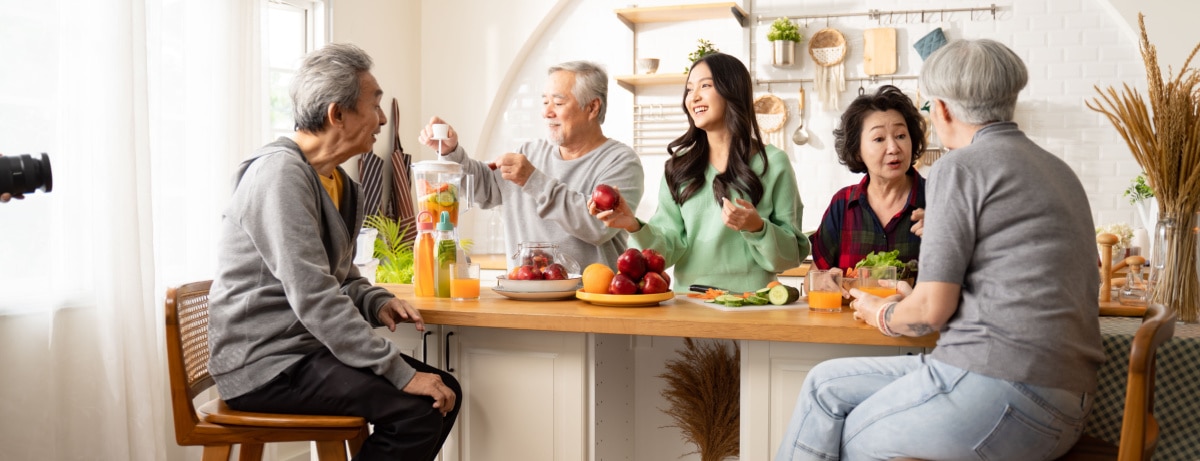B&C
|Carousel main title
Main title
We answer your most Googled questions on menopause

We answer your questions on menopause
H&B are here to make menopause chat easier and less taboo. So, let’s talk menopause. This natural, hormonal process that most women experience arouses a lot of questions and speculation.
Jump to: Most Googled questions | Ask H&B: Dr Angela Sharma
Research amongst GB women aged 40+ from black, Asian and minority ethnic backgrounds revealed that over a quarter (26%) in any stage of the menopause or are unsure, claim it is difficult to access support tailored to them.
What you're asking
1
What are the first signs of menopause?
Most women will experience symptoms of menopause and many women will experience early symptoms while still having periods.1
The NHS recognises the main symptom of early menopause to be periods becoming infrequent or stopping altogether – without any other reason (such as pregnancy).
Some women may also get other typical menopausal symptoms, including:
• Hot flushes
• Night sweats
• Vaginal dryness and discomfort during sex
• Difficulty sleeping
• Low mood or anxiety
• Reduced sex drive (libido)
• Problems with memory and concentration2
But there are actually 34 symptoms of the menopause.
2
Which age does menopause start?
Menopause usually happens between the ages of 45 and 55.3 Though of course, this can vary, and each woman’s experience is different and personal to them. There can be different reasons for women going through early menopause, so find out more with our most googled questions on perimenopause.
As Davina McCall says, ‘I used to think that menopause was an age thing and now I realise it’s a woman thing.’4
3
What does menopause mean?
Menopause is a natural biological process that marks the end of your menstrual cycles. It's diagnosed after you've gone 12 months without a menstrual period.5
4
What does menopause do to the body?
Menopause is the point when you no longer have menstrual periods. At this stage, your ovaries have stopped releasing eggs and stopped producing most of their oestrogen.
During menopause, your body goes through major hormonal changes — decreasing the levels of some hormones it makes.6
5
Will menopause cause longer periods?
Women going through menopause most likely think of it as the time for an end to predictable monthly periods.
Researchers at the University of Michigan say it’s normal, however, for the majority of them to experience an increase in the amount and duration of bleeding episodes, which may occur at various times throughout the menopausal transition.7
This being said, you shouldn’t experience bleeding after the menopause has been diagnosed – which is the 12 months prior without a menstrual period.
6
Why does menopause affect sleep?
Menopause is a time of major hormonal, physical, and psychological change for women - and all that change can cause a lot of sleep disruption.
Your sleep can be affected by many menopausal symptoms, whether it be anxiety and the impacts of that or Vasomotor symptoms (VMS).
Vasomotor symptoms are those caused by constriction or dilation of blood vessels. Experienced by many women during the menopausal transition, VMS episodes can cause profuse heat accompanied by sweating and flushing.8
Menopausal symptoms can vary from woman to woman and throughout perimenopause into menopause. Sleep issues are common, with sleep disorders affecting 39 to 47 percent of perimenopausal women and 35 to 60 percent of postmenopausal women.9
That’s why we’ve put together top tips on managing sleep during the menopause.
7
Are menopause symptoms cyclical?
Symptoms such as mood changes, sleep disturbances, breast tenderness, migraines and pains can be caused by the perimenopause, due to the rapid changes in hormone levels. These symptoms may be cyclical with your menstrual pattern.10
8
Where does the menopause affect?
Menopause affects each woman uniquely and in various ways.
During menopause you may experience changes in your bone or heart health, your body shape and composition, or your physical function. This is due to the body using energy differently, fat cells changing and weight gain becoming more probable.11
Take a look at 11 natural remedies for menopause & symptoms for some tips on how to support your symptoms.
9
Will menopause symptoms ever end?
Menopause symptoms may last for a decade or more. However, there are some things that you can do to help manage these symptoms. For example, a healthy diet and regular exercise alongside simple lifestyle changes can improve some symptoms. Head over to the most Googled questions on diet and menopause to learn more about this.
Hormone replacement therapy (HRT) can help with symptoms of menopause and top up hormone levels. Modern forms of HRT are lower risk than before and are a popular choice of treatment.12
Though, it’s important to speak to your GP about menopause support, especially if you want to go down a medical route.
There’s also the option of cognitive behaviour therapy (CBT), this is a non-medical approach to dealing with menopause symptoms. CBT can be helpful for some menopausal difficulties, such as anxiety and stress, low mood, hot flushes and night sweats, sleep problems and fatigue.13
10
Can a woman have an orgasm after menopause?
YES!
Women can still reach an orgasm both during and after menopause. It’s a common misconception that once you enter menopause, you lose any ability to orgasm or experience a fulfilling sex life.14
All about perimenopause
The final say
That concludes our answers to your most commonly Googled questions on the menopause. We hope we have cleared up some of your queries, and reassured you that despite how abnormal it may make you feel, you’re not alone and it really is normal to feel these certain ways.
Here at Holland & Barrett we’re offering every woman personalised support through a free 1-2-1 consultation with a menopause trained advisor, book in store or online.
Research amongst GB women aged 40+ from black, Asian and minority ethnic backgrounds revealed that more than one in ten (15%) say being able to speak to a GP/ health professional in their own language would make a positive difference.
That’s why we’ve made sure that our online appointments are available with menopause trained advisors who natively speak Urdu, Punjabi, Gujarati and Hindi. Book your consultation online and together, we can navigate your unique menopause journey.
And… We’ve also answered your questions on perimenopause and other menopause related topics, check out below!
All figures, unless otherwise stated, are from YouGov Plc. Total sample size was 772 40+ Female BAME respondents out of which 650 respondents are in any menopausal period or are unsure. Fieldwork was undertaken between 30th May - 7th June 2023. The survey was carried out online. The figures have been weighted to be representative of GB BAME women aged 40+.
- https://www.nhsinform.scot/healthy-living/womens-health/later-years-around-50-years-and-over/menopause-and-post-menopause-health/signs-and-symptoms-of-menopause
- https://www.nhs.uk/conditions/early-menopause/
- https://www.nhs.uk/conditions/menopause/
- https://www.themenopausecharity.org/dt_testimonials/davina-mccall/#:~:text=I%20used%20to%20think%20that,realise%20it's%20a%20woman%20thing.
- https://www.mayoclinic.org/diseases-conditions/menopause/symptoms-causes/syc-20353397
- https://my.clevelandclinic.org/health/diseases/21841-menopause
- https://news.umich.edu/prolonged-and-heavy-bleeding-during-menopause-is-common/#:~:text=Researchers%20at%20the%20University%20of,times%20throughout%20the%20menopausal%20transition
- https://www.ncbi.nlm.nih.gov/pmc/articles/PMC3185243/#:~:text=VMS%2C%20or%20hot%20flashes%20and,women%20during%20the%20menopausal%20transition
- https://www.sleepfoundation.org/women-sleep/menopause-and-sleep
- https://wellfemme.com.au/understanding-hormonal-changes-during-menopause/#:~:text=What%20symptoms%20are%20due%20to,cyclical%20with%20your%20menstrual%20pattern.
- https://www.nia.nih.gov/health/what-menopause#:~:text=The%20menopausal%20transition%20affects%20each,composition%2C%20or%20your%20physical%20function.
- https://www.ageuk.org.uk/information-advice/health-wellbeing/mind-body/menopause-symptoms-and-support/
- https://thebms.org.uk/2017/02/new-factsheets-cognitive-behaviour-therapy-cbt-menopausal-symptoms/
- https://femmepharma.com/can-a-woman-have-an-orgasm-after-menopause/










